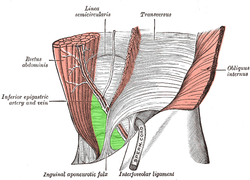Inguinal triangle
Appearance
| Inguinal triangle | |
|---|---|
 Internal (from posterior to anterior) view of right inguinal area of the male pelvis. Inguinal triangle is labeled in green. The three surrounding structures: inferior epigastric vessels: Run from upper left to center. inguinal ligament: Runs from upper right to bottom left. rectus abdominis muscle: Runs from upper left to bottom left, labeled rectus at upper left. | |
 External view. Inguinal triangle is labeled in green. Borders: inferior epigastric artery and vein: labeled at center left, and run from upper right to bottom center. inguinal ligament: not labeled on diagram, but runs a similar path to the inguinal aponeurotic falx, labeled at bottom. rectus abdominis muscle: runs from upper left to bottom left. | |
| Details | |
| Identifiers | |
| Latin | trigonum inguinale |
| TA98 | A10.1.02.433 |
| TA2 | 3795 |
| FMA | 256506 |
| Anatomical terminology | |
In human anatomy, the inguinal triangle is a region of the abdominal wall. It is also known by the eponym Hesselbach's triangle, after Franz Kaspar Hesselbach.
Structure
[edit]It is defined by the following structures:
- Medial border: Lateral margin of the rectus sheath.[1][2]
- Superolateral border: Inferior epigastric vessels.[1][2]
- Inferior border: Inguinal ligament.[1][2]
This can be remembered by the mnemonic RIP (Rectus sheath (medial), Inferior epigastric artery (lateral), Poupart's ligament (inguinal ligament, inferior).
Clinical significance
[edit]The inguinal triangle contains a depression referred to as the medial inguinal fossa, through which direct inguinal hernias protrude through the abdominal wall.[3]
History
[edit]The inguinal triangle is also known as Hesselbach's triangle, after Franz Kaspar Hesselbach.[2]
See also
[edit]References
[edit]- ^ a b c Courtney M. Townsend Jr., MD, R. Daniel Beauchamp, MD, B. Mark Evers, MD and Kenneth L. Mattox, MD (2008). "Ch.43". Sabiston Textbook of Surgery (18th ed.). Elsevier. ISBN 978-1-4160-5233-3.
{{cite book}}: CS1 maint: multiple names: authors list (link) - ^ a b c d Cureton, Elizabeth L.; Ereso, Alexander Q.; Victorino, Gregory P. (2009-01-01), Harken, Alden H.; Moore, Ernest E. (eds.), "Chapter 55 - Inguinal Hernia", Abernathy's Surgical Secrets (Sixth Edition), Philadelphia: Mosby, pp. 269–276, ISBN 978-0-323-05711-0, retrieved 2021-01-23
- ^ MedNote. Red Anatomy. URL: http://www.mednote.co.kr/Rednote/RedAnatom.htm Archived 2006-04-23 at the Wayback Machine. Accessed December 15, 2005.
